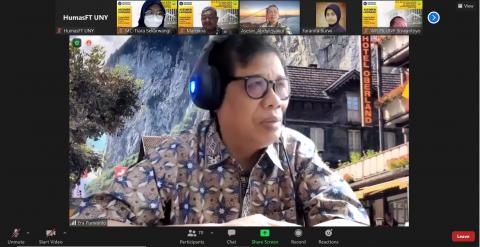Field Assessment of the Applied Electrical Engineering Study Program

The Bachelor of Applied Electrical Engineering Study Program (D4) Faculty of Engineering, Yogyakarta State University, underwent an online field assessment (AL) process with representatives of the National Accreditation Board for Higher Education (BAN-PT) for accreditation assessment on Friday and Saturday, October 10 and 11, 2021. The BAN-PT assessor on duty at the Navy is Dr. Ir. Era Purwanto, M.Eng., from Surabaya State Electronics Polytechnic, and Dr. Abdul Syakur, M.T., from Diponegoro University. AL began with remarks by the Chancellor of Yogyakarta State University (UNY), which in this case were delivered by the Vice Chancellor for Academic Affairs, Prof. Dr. Margana, M.Hum., M.A.
Margana said in his speech that the existence of a study program certainly needs to continue to be formally legalized through the accreditation process. "We are sure that this stage will provide various inputs to improve the quality of study programs," he said.
"UNY continues to be committed to carrying out three types of education, namely, academic, vocational, and professional, and starting in 2019, the UNY D3 vocational path has morphed into a D4 or Applied Bachelor, which will gradually be centered on the UNY Gunung Kidul and Wates campuses," continued Margana.
"We continue to improve ourselves in order to produce graduates who are competent by balancing three dimensions, namely cognitive, skills, and attitude, through a combination of hard skills and soft skills as well as optimizing the development of the right and left brain," he added.
Meanwhile, Era Purwanto also highlighted vocational education, which is currently the foundation of the nation and continues to receive direct attention from President Joko Widodo. "Even though it seems separated, the vocational field must continue to synergize with the academic field so that they can complement and enhance each other," he continued.
"One thing that also continues to be considered in the vocational field is the development of TEFA (Teaching Factory) so that it has a strategic role in actualizing the concept of problem-based learning in the teaching and learning process," he said.
Abdul Syakur added that this assessment process is more focused on activities to photograph, match, and verify the data that is sent with the existing reality. "As we all know, data is very dynamic, so it is possible that the data that has been submitted to the assessor changes at any time," he emphasized.
Meanwhile, the Dean of the Faculty of Engineering, Prof. Herman Dwi Surjono, Ph.D., in his presentation emphasized again that the Bachelor of Applied Electrical Engineering Study Program (D4) is a development of (D3) Electrical Engineering based on the attachment to the letter from the Ministry of Research, Technology, and Higher Education No. B/185/C. Ca/KB.01.00/2019 concerning the assignment of changes in Diploma III study programs to applied bachelors in higher education to strengthen vocational education levels against future industrial challenges.
After the opening, the event then continued with the process of verifying Forms III A and III B for the faculty and study program. There are seven standards that are reviewed as the basis for assessment, including (1) vision, mission, goals, and objectives, and achievement strategies; (2) governance, leadership, management systems, and quality assurance; (3) students and graduates; (4) resources—human resources; (5) curriculum, learning, and academic atmosphere; (6) financing, facilities, and infrastructure; and (7) research, service/community service, and cooperation.
All stages of this activity are certainly very relevant to the implementation of UNY's sustainable development goals in the field of quality education.
